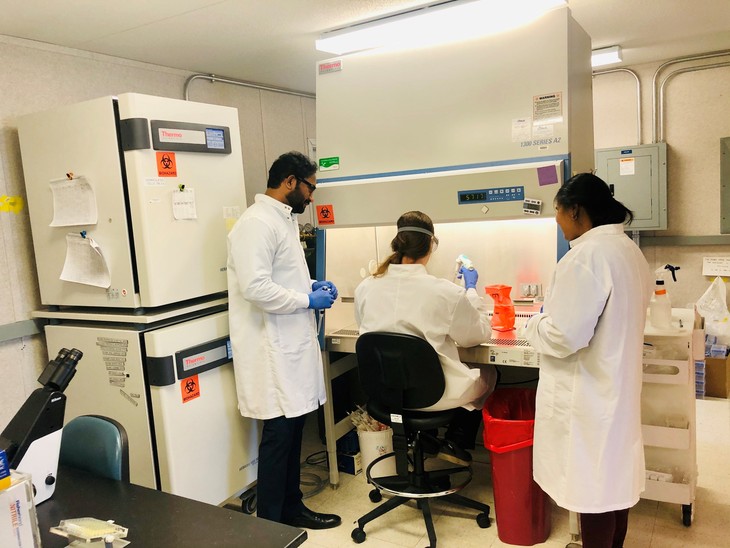UNIVERSITY PARK, Pa. — Animal infectious illnesses such as avian influenza and African swine fever pose a significant threat to animal health and welfare and can cause economic instability and food insecurity for people all over the world.
Exploring the emergence, spread and control of those diseases is the focus of the inaugural Emerging Animal Infectious Disease Conference, scheduled for March 23-25, 2020, at the Wyndham Garden Inn. The event will be co-hosted by Penn State’s College of Agricultural Sciences, the Pennsylvania Department of Agriculture and Penn State’s Center for Security Research and Education.
The conference will bring together key stakeholders to discuss current successes and lessons learned from past experiences in combating foreign animal diseases. Participants also will prioritize research, preparedness and response strategies aimed at safeguarding human and animal health, according to Rick Roush, dean of the College of Agricultural Sciences.
“Our national security depends on investments in protecting our animal agriculture from infectious diseases from across our borders,” said Roush. “African swine fever is a particular threat. Penn State is well positioned to lead cutting-edge research in the detection, diagnosis and prevention of these diseases. We are pleased to be a driving force behind this conference.”
Pennsylvania Secretary of Agriculture Russell Redding agreed there is no substitute for biosecurity planning when it comes to preventing the economic devastation that the introduction of an infectious foreign animal disease would bring to Pennsylvania and the nation.
“This conference will equip veterinarians, producers and allied industry personnel with tools that will be critical in preventing disease and safeguarding Pennsylvania’s $4.9 billion animal agriculture industry and the communities who depend on it,” Redding said.
A devastating animal disease outbreak in recent history took place between December 2014 and June 2015, when more than 50 million chickens and turkeys in the U.S. were destroyed to stop the spread of highly pathogenic avian influenza.
These lost birds accounted for about 12% of the U.S. table-egg laying population and 8% of the estimated inventory of turkeys grown for meat, according to the U.S. Department of Agriculture. In response to this historic animal-disease event, many destination markets for U.S. poultry commodities levied trade restrictions on U.S. poultry exports.
“This was the worst animal disease outbreak in U.S. history, causing billions of dollars in economic loss, and is one example of how devastating a foreign animal disease can be — not only to animal agriculture but to the country’s economy,” said Suresh Kuchipudi, clinical professor of microbiology, who is chairing the conference with Deanna Behring, the college’s assistant dean and director of international programs.
Kuchipudi noted that many countries now are preparing for the growing threat of African swine fever, a highly contagious and deadly viral disease affecting both domestic and wild pigs. The disease has decimated China’s swine population.
“At Penn State, we have excellent resources and the expertise in animal disease to lead initiatives to ensure the sustainability of animal agriculture, including a high-security diagnostic testing facility to address emerging threats,” said Kuchipudi, who also is the associate director of Penn State’s Animal Diagnostic Laboratory. The facility is fully accredited by the American Association of Veterinary Laboratory Diagnosticians.
“But we cannot do it alone — foreign animal disease is a problem that requires an international stand, and that’s why we are bringing together world leaders in this realm to advance discussion and action,” he said.
Anticipated outcomes of the gathering include raising awareness of biosecurity among key stakeholders and the development of a biosecurity certificate course that would be offered by Penn State.
The conference will feature experts from the U.S. Department of Agriculture/Foreign Animal Disease Diagnostic Laboratory; Kansas State University; University of California, Davis; Animal and Plant Health Agency, United Kingdom; the Zoetis Center for Transboundary and Emerging Diseases; and the Pirbright Institute, United Kingdom.
Sessions will be chaired by Penn State faculty including Terry Etherton, distinguished professor of animal nutrition and head of the Department of Animal Science; Vivek Kapur, professor of animal science and Huck Distinguished Chair in Global Health; Isabella Cattadori, associate professor of biology in the Eberly College of Science; Claudia Schmidt, assistant professor of agricultural economics; Andrew Read, director, Huck Institutes of the Life Sciences, Evan Pugh Professor of Biology and Entomology, and professor of biotechnology; Troy Sutton, assistant professor of veterinary and biomedical sciences; Dave Swartz, assistant director for animal systems programs, Penn State Extension; Sandeep Prabhu, professor and head, Department of Veterinary and Biomedical Sciences; Patty Dunn, avian pathologist and field investigator; and Bhushan Jayarao, director of the Animal Diagnostic Lab.
In addition, Deep Tewari, director of the Pennsylvania Veterinary Laboratory, and Kevin Brightbill, state veterinarian, will lead sessions.
“We could not be more pleased with the caliber of speakers who will be taking part in our conference,” said James Houck, director of Penn State’s Center for Security Research and Education. “They all have a keen understanding of animal infectious diseases and the profound economic, psychological and, in some cases, human health consequences an outbreak would have in Pennsylvania and beyond.”
Veterinarians and veterinary technicians can obtain continuing education credits by attending the conference. To learn more or to register, visit http://www.cvent.com/d/4hq1dm or call 877-778-2937.

